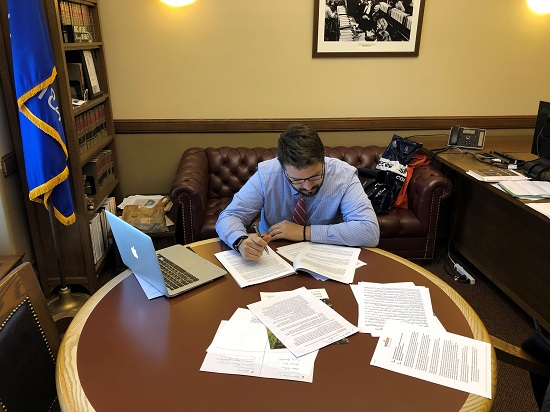
The Goyke Report - Special Session Alert!
December 3, 2018
Friends and Neighbors,
I am writing to alert you to a lame-duck Special Session that has been called by the majority party in advance of Governor-Elect Evers taking office in January.
A lame-duck session is a scheduled legislative debate where the outgoing political party passes laws prior to the incoming political party/officials being sworn into office.
Tomorrow - Tuesday, December 4th, the State Legislature is scheduled to be in session to consider legislation that will make changes negatively affecting incoming Governor-Elect Evers, changes to legislative procedure, elections dates, and more.
The process for these bills has not been transparent to legislators, and most importantly, you the public. I strongly oppose the process used by the majority party to introduce this legislation.
For your information, the legislation is 141 pages long. The legislation was introduced late Friday afternoon (11.30.18), will receive only one limited public hearing in Madison (today, 12.3.18), and will be voted on in less than 4 days by the entire legislature (tomorrow, 12.4.18).
To help keep you up to date and informed:
A summary of the legislation by the non-partisan Wisconsin Legislative Fiscal Bureau can be viewed here.
Please see additional information and summaries below. I hope this alert and information is helpful to you and keeps you informed. Thank you to all of my neighbors who have contacted me about these pieces of legislation. Knowing your thoughts helps me better represent our shared community.
As always, please let me know if I can be of any assistance to you.
All the best,

Evan Goyke
State Representative
18th Assembly District

Rep. Goyke today at the State Capitol reading the proposed Special Session legislation
Special Session Additional Information
The legislation introduced for tomorrow's special session places new restrictions on Executive authority, the Attorney General, and makes numerous other changes to State law including election law. These bills are clearly directed at our newly democratically elected Governor and Attorney General.
The Milwaukee Journal Sentinel wrote an excellent summary for readers of the major provisions of the legislation and I have included that below.
Credit: Milwaukee Journal Sentinel
Your health care might be impacted
The proposal would take power away from Evers and incoming Democratic
Attorney General Josh Kaul, limiting their ability to immediately
withdraw Wisconsin from a federal lawsuit to overturn the Affordable
Care Act. That could affect health care coverage for people with
preexisting conditions or those young people (26 and under) on their
parents' health insurance. Republicans have added a separate provision
that includes protections for those with preexisting conditions, but
that isn't the same as leaving Obamacare intact.
Your ability to vote
early might be limited
Wisconsinites would see limits to early voting if the GOP plan passes. Early voting, or absentee voting, would only be available for two weeks before an election under the proposal. Early voting in this year's general election was more popular than ever before, and clerks have been pushing Wisconsin to expand to true "early voting" to streamline the process.
New limits to early voting will likely lead to lawsuits, similar to one
previously won by One Wisconsin. That could mean more costly litigation,
with taxpayers picking up the tab. A federal judge has already ruled
communities can provide more extensive early voting, which was in place
for November's elections.
More elections to vote
in, at a high cost
The GOP plan to move the 2020 presidential primary from April to March would cause the state to hold three elections instead of two that spring.
That would mean more trips to the polls for Wisconsin voters, or to
their clerks' offices for early voting.
It would also mean a higher
price tag — the Wisconsin Elections commission has estimated that moving
the presidential primary will cost about $7 million. And that number
likely would be higher once the cost of expected litigation is included.
How and where crime
is fought
Under the GOP plan, lawmakers could replace the attorney general with
private attorneys of their choosing for key cases; require lawmakers to
sign off on court settlements; give lawmakers instead of the attorney
general control of how to spend court settlements; and eliminate the
solicitor general’s office that oversees high-profile litigation.
Blocking Kaul from deciding how settlement money is spent could mean
less money for anti-crime initiatives, victim's funds, and other
criminal justice work.
The condition of the roads you drive
Another provision in the plan would mandate that the state channel much
of the federal road money it gets into a small number of projects. That
would mean more projects would be funded with state money only and could
get out of having to comply with federal environmental regulations and
standards that require construction crews to make union-level wages.
But the arrangement could mean the state would miss out on
qualifying for some federal aid that it would otherwise qualify for,
according to a report by the nonpartisan Legislative Fiscal Bureau.
Another measure would allow local governments to avoid having to
follow state standards for some road projects, even when they use state
funds.
What To Do? Engage Your Elected Officials
Your engagement on these proposals to let your elected officials know where you stand is vitally important. I have included below contact information for the Governor's office, as well as the legislative hotline directory. Thank you for working alongside me in calling attention to these overreaching pieces of legislation.
Contact Governor Walker: (608) 266-1212
Wisconsin Legislative Hotline Directory:
1-800-362-9472
If you would like to have your name removed from this email list, please reply to this message with “Unsubscribe” in the subject line